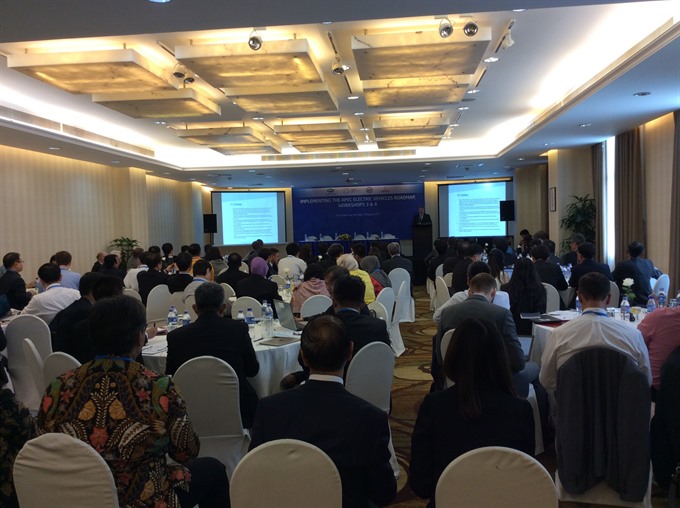 Society
Society

Widespread usage of electric vehicles would help reduce dependence on fossil fuels and build low-carbon societies in the Asia-Pacific region, APEC officials said.
 |
| APEC-member economies discuss the use of electric vehicles at a workshop during the Senior Officials Meeting (SOM-3) in HCM City on August 19. — VNS Photo HC |
HCM CITY – Widespread usage of electric vehicles would help reduce dependence on fossil fuels and build low-carbon societies in the Asia-Pacific region, APEC officials said.
The officials were participating in two workshops held at the third APEC Senior Officials Meeting (SOM 3) in HCM City on August 19.
Adopting priority standards for electric vehicles among the region is vitally important, they said.
Baek-Haeng Lee of the Korea Automotive Technology Institute in South Korea, speaking on the sidelines of the workshop, told Việt Nam News: “South Korea uses the Power Line Communication Protocol (PLC), the priority standard for promoting widespread usage of electric vehicles in the region."
Phạm Anh Tuấn, deputy director general of the heavy industry department under Việt Nam’s Ministry of Industry and Trade, said the country would create standards related to electric vehicles in the near future.
“It takes a long time to conduct surveys on the potential of electric vehicle usage, because vehicles using traditional petrol have been used in the country for hundreds of years,” he said.
However, Việt Nam would eventually have to use electric vehicles, he said, adding that the country’s auto industry strategy to 2025 gives priority to environmentally-friendly vehicles.
Appropriate infrastructure for the use of electric vehicles would also be built in the future, he added.
Vũ Tấn Công, an expert at SOPEC (Saigon-Stuttgart Operational Project Excellence Consulting), specialising in project management for small- and medium-sized companies in the manufacturing industry, said that electric vehicles were mostly being used at areas in tourism parks in Việt Nam.
“These vehicles are not used widely in Việt Nam because of high prices. They cannot run for a long distance and their spent batteries and accumulators are difficult to re-use because there is no technology for this in the country,” Công said.
"Hybrid vehicles that use both traditional petrol and electricity are one option in Việt Nam," he said, adding that the country should develop financial incentives for production and consumption of these vehicles.
Several foreign companies that want to invest in electric-car industry were waiting for such policies, Công said.
New registrations of electric cars hit a global record in 2016, with over 750,000 sales, according to the International Energy Agency’s global electric vehicles outlook 2017.
Last year, the global electric-car stock surpassed 2 million vehicles, after crossing the 1 million threshold in 2015.
In 2015, APEC endorsed a roadmap for electric vehicles, including adoption of international standards.
Last year, APEC also held workshops on electric-vehicle usage at its conference in Manila. —VNS




